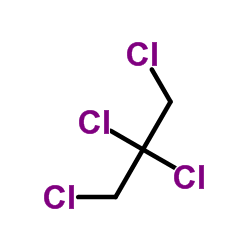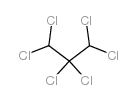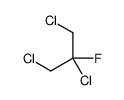13116-53-5
| Name | 1,2,2,3-Tetrachloropropane |
|---|---|
| Synonyms |
1,2,2,3-TETRACHLOROPROPANE
MFCD00039362 EINECS 236-043-9 |
| Density | 1.5±0.1 g/cm3 |
|---|---|
| Boiling Point | 176.3±8.0 °C at 760 mmHg |
| Molecular Formula | C3H4Cl4 |
| Molecular Weight | 181.876 |
| Flash Point | 62.5±15.8 °C |
| Exact Mass | 179.906708 |
| LogP | 2.46 |
| Vapour Pressure | 1.5±0.3 mmHg at 25°C |
| Index of Refraction | 1.483 |
|
1,2,2,3-Tetrachloropropane
Revision number: 5
SAFETY DATA SHEET Section1. IDENTIFICATION Product name:1,2,2,3-Tetrachloropropane Revision number:5 Section2. HAZARDS IDENTIFICATION GHS classification PHYSICAL HAZARDS Category 4 Flammable liquids HEALTH HAZARDS Category 4 Acute toxicity (Oral) Acute toxicity (Dermal)Category 4 Category 4 Acute toxicity (Inhalation) Skin corrosion/irritationCategory 2 Category 2A Serious eye damage/eye irritation ENVIRONMENTAL HAZARDSNot classified GHS label elements, including precautionary statements Pictograms or hazard symbols Warning Signal word Hazard statementsCombustible liquid Harmful if swallowed, in contact with skin or if inhaled Causes skin irritation Causes serious eye irritation Precautionary statements: Keep away from flames and hot surfaces. [Prevention] Avoid breathing dust/fume/gas/mist/vapours/spray. Use only outdoors or in a well-ventilated area. Do not eat, drink or smoke when using this product. Wash hands thoroughly after handling. Wear protective gloves and eye/face protection. 1,2,2,3-Tetrachloropropane Section2. HAZARDS IDENTIFICATION [Response]IF INHALED: Remove victim to fresh air and keep at rest in a position comfortable for breathing. Call a POISON CENTER or doctor/physician if you feel unwell. IF SWALLOWED: Call a POISON CENTER or doctor/physician if you feel unwell. Rinse mouth. IF IN EYES: Rinse cautiously with water for several minutes. Remove contact lenses, if present and easy to do. Continue rinsing. If eye irritation persists: Get medical advice/attention. IF ON SKIN: Gently wash with plenty of soap and water. If skin irritation occurs: Get medical advice/attention. Wash contaminated clothing before reuse. Call a POISON CENTER or doctor/physician if you feel unwell. [Storage]Store in a well-ventilated place. Keep cool. [Disposal]Dispose of contents/container through a waste management company authorized by the local government. Section3. COMPOSITION/INFORMATION ON INGREDIENTS Substance Substance/mixture: Components:1,2,2,3-Tetrachloropropane Percent:>95.0%(GC) CAS Number:13116-53-5 Chemical Formula:C3H4Cl4 Section4. FIRST AID MEASURES Remove victim to fresh air and keep at rest in a position comfortable for breathing. Inhalation: Call a POISON CENTER or doctor/physician if you feel unwell. Remove/Take off immediately all contaminated clothing. Gently wash with plenty of Skin contact: soap and water. If skin irritation or rash occurs: Get medical advice/attention. Eye contact:Rinse cautiously with water for several minutes. Remove contact lenses, if present and easy to do. Continue rinsing. If eye irritation persists: Get medical advice/attention. Ingestion:Call a POISON CENTER or doctor/physician if you feel unwell. Rinse mouth. Protection of first-aiders:A rescuer should wear personal protective equipment, such as rubber gloves and air- tight goggles. Section5. FIRE-FIGHTING MEASURES Suitable extinguishingDry chemical, foam, water spray, carbon dioxide. media: Unsuitable extinguishing Solid streams of water media: Specific hazards arising Take care as it may decompose upon combustion or in high temperatures to from the chemical:generate poisonous fume. Precautions for firefighters: Fire-extinguishing work is done from the windward and the suitable fire-extinguishing method according to the surrounding situation is used. Uninvolved persons should evacuate to a safe place. In case of fire in the surroundings: Remove movable containers if safe to do so. Special protectiveWhen extinguishing fire, be sure to wear personal protective equipment. equipment for firefighters: Section6. ACCIDENTAL RELEASE MEASURES Use personal protective equipment. Keep people away from and upwind of spill/leak. Personal precautions, protective equipment and Ensure adequate ventilation. Entry to non-involved personnel should be controlled emergency procedures: around the leakage area by roping off, etc. Environmental precautions: Prevent product from entering drains. 1,2,2,3-Tetrachloropropane Section6. ACCIDENTAL RELEASE MEASURES Methods and materials for Absorb spilled material in a suitable absorbent (e.g. rag, dry sand, earth, saw-dust). containment and cleaning In case of large amount of spillage, contain a spill by bunding. Adhered or collected up: material should be promptly disposed of, in accordance with appropriate laws and regulations. Prevention of secondary Remove all sources of ignition. Fire-extinguishing devices should be prepared in hazards:case of a fire. Use spark-proof tools and explosion-proof equipment. Section7. HANDLING AND STORAGE Precautions for safe handling Technical measures:Handling is performed in a well ventilated place. Wear suitable protective equipment. Prevent generation of vapour or mist. Keep away from flames and hot surfaces. Take measures to prevent the build up of electrostatic charge. Use explosion-proof equipment. Wash hands and face thoroughly after handling. Use a closed system, ventilation. Advice on safe handling: Avoid contact with skin, eyes and clothing. Conditions for safe storage, including any incompatibilities Storage conditions:Keep container tightly closed. Store in a cool, dark and well-ventilated place. Store away from incompatible materials such as oxidizing agents. Packaging material:Comply with laws. Section8. EXPOSURE CONTROLS / PERSONAL PROTECTION Engineering controls:Install a closed system or local exhaust as possible so that workers should not be exposed directly. Also install safety shower and eye bath. Personal protective equipment Respiratory protection: Vapor respirator. Follow local and national regulations. Protective gloves. Hand protection: Eye protection:Safety glasses. A face-shield, if the situation requires. Skin and body protection: Protective clothing. Protective boots, if the situation requires. Section9. PHYSICAL AND CHEMICAL PROPERTIES Physical state (20°C):Liquid Form:Clear Colorless - Slightly pale yellow Colour: Odour:No data available pH: No data available Melting point/freezing point:No data available Boiling point/range:164°C Flash point:No data available Flammability or explosive limits: Lower:No data available Upper:No data available Relative density:1.50 Solubility(ies): [Water]No data available [Other solvents]No data available Section10. STABILITY AND REACTIVITY Chemical stability:Stable under proper conditions. Possibility of hazardous No special reactivity has been reported. reactions: Open flame Conditions to avoid: Incompatible materials: Oxidizing agents Hazardous decomposition Carbon monoxide, Carbon dioxide, Hydrogen chloride products: 1,2,2,3-Tetrachloropropane Section11. TOXICOLOGICAL INFORMATION Acute Toxicity:skn-rbt LD50:>7940 mg/kg orl-rat LD50:6300 mg/kg Skin corrosion/irritation: No data available Serious eyeNo data available damage/irritation: Germ cell mutagenicity: No data available Carcinogenicity: IARC =No data available No data available NTP = Reproductive toxicity:No data available RTECS Number:TZ7000100 Section12. ECOLOGICAL INFORMATION Ecotoxicity: Fish:48h LC50:35.43 mg/L (Oryzias latipes) No data available Crustacea: Algae:No data available Persistence / degradability: 1 % (by BOD), 0 % (by TOC), 4 % (by GC) Bioaccumulative12 - 54 (conc. 0.2 mg/L), 22 - 52 (conc. 0.02 mg/L) potential(BCF): Mobility in soil Log Pow:No data available Soil adsorption (Koc):No data available Henry's LawNo data available constant(PaM3/mol): Section13. DISPOSAL CONSIDERATIONS Recycle to process, if possible. Consult your local regional authorities. You may be able to burn in a chemical incinerator equipped with an afterburner and scrubber system. Observe all federal, state and local regulations when disposing of the substance. Section14. TRANSPORT INFORMATION Hazards Class:Does not correspond to the classification standard of the United Nations UN-No:Not listed Section15. REGULATORY INFORMATION Safe management ordinance of dangerous chemical product (State Council announces on January 26, 2002 and revised on February 16,2011): Safe use and production, the storage of a dangerous chemical, transport, loading and unloading were prescribed. SECTION 16 - ADDITIONAL INFORMATION N/A |
CHEMICAL IDENTIFICATION
HEALTH HAZARD DATAACUTE TOXICITY DATA
|
| RTECS | TZ7000100 |
|---|---|
| HS Code | 2903199000 |
| Precursor 6 | |
|---|---|
| DownStream 8 | |
| HS Code | 2903199000 |
|---|---|
| Summary | 2903199000 other saturated chlorinated derivatives of acyclic hydrocarbons。Supervision conditions:None。VAT:17.0%。Tax rebate rate:9.0%。MFN tariff:5.5%。General tariff:30.0% |













